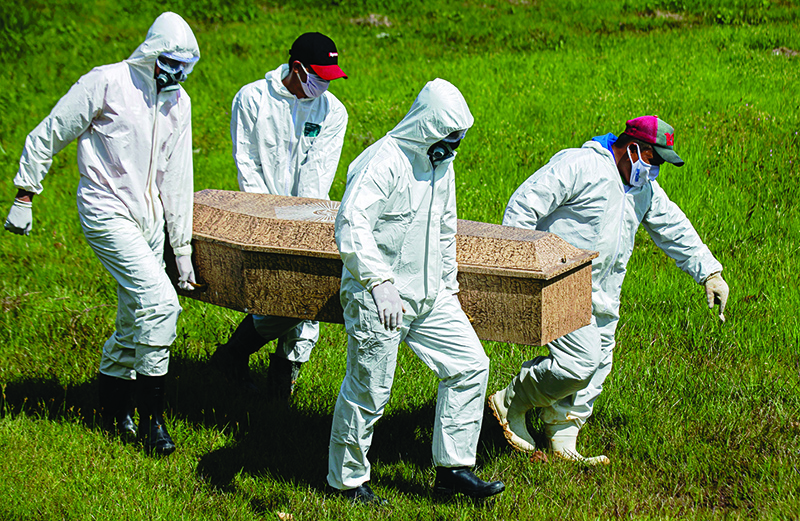
SAO PAULO: The coronavirus pandemic advanced steadily Wednesday through Latin America, where the death toll passed the grim milestone of 70,000 fatalities even as Europe planned to reopen its external borders to foreigners in July. The Americas - North and South - remained the epicenter of the global health crisis, accounting for almost half the 412,926 deaths and 7.3 million infections worldwide, based on an AFP tally of figures released by national health ministries by 1900 GMT.
Brazil accounts for almost 40,000 - or more than half - of Latin America’s total deaths, registering 1,274 fatalities in the last 24 hours. Even as the virus continued to cut a swath through the country, economic capital Sao Paulo began reopening shops on Wednesday as part of a gradual resumption of activity. Shopping malls were set to reopen in a slew of cities on Thursday, the day before Brazilians celebrate Valentine’s Day. Mexico, with nearly 15,000 COVID-19 deaths, and Peru, with almost 6,000 deaths from 208,000 cases, are also battling a deep surge.
However lawmakers in Bolivia, with a relatively small toll of 487 coronavirus deaths, Wednesday approved the date of September 6 for the country’s virus-delayed general elections. Elsewhere, tourism-dependent Miami reopened its beaches for the first time in three months amid evidence that despite nearly two million cases and 112,000 deaths from COVID-19 in the US, that the worst may have passed for the economy. “I almost started crying as soon as I came out onto the beach,” said travel agent Julie Isaacson, 63. The US Federal Reserve projected a solid rebound for the US economy next year. Fed Chair Jerome Powell however cautioned that the outlook remains highly uncertain, and both the central bank and Congress may have to do more to boost the recovery.
‘Gradual and partial’ reopening
Across the Atlantic, the European Union said it hoped to reopen its external borders to foreigners in July, as leaders look to loosen the economic stranglehold of virus lockdowns that are triggering a steep global downturn. Meanwhile the Organization for Economic Co-operation and Development (OECD) said in a grim warning that the world economy is on course to contract by at least six percent this year due to virus shutdowns. By the end of next year, the loss of income should surpass that of “any previous recession over the last 100 years outside wartime”, the forecast warned.
EU member states have the final say on border measures. But Brussels is suggesting a “gradual and partial” reopening of external frontiers to travellers outside the bloc from July 1, diplomatic chief Josep Borrell said Wednesday. Greece, whose economy depends heavily on tourism, has already announced it will reopen its skies from June 15 to a list of countries including non-EU states such as Australia, China and South Korea.
Austria and Germany also announced they were easing travel restrictions, though Germany extended a warning against travel outside the EU until August 31. In Spain, where more than 27,000 people have died from COVID-19, La Liga soccer championships are set to resume on Thursday for the first time in three months. Meanwhile in Britain, which has the highest death toll in Europe, Prime Minister Boris Johnson defended what he described as the country’s “astonishing” efforts to tackle the virus. But one top scientist there said the number of fatalities could have been halved had lockdown measures been introduced a week sooner. Italian prosecutors said they wanted to question Prime Minister Giuseppe Conte and the health and interior ministers over how the government handled the pandemic.
Second wave fears
Elsewhere around the globe, clusters of infection were growing as governments relaxed restrictions. Earlier this week, the WHO warned against complacency. The WHO’s regional arm, the Pan American Health Organization, has warned that the upcoming hurricane season could further hamper the fight against the virus. Iran announced more than 2,000 new cases Wednesday, part of a recent surge the government attributes to increased testing. Indonesia also posted a record number of 1,241 new coronavirus cases, sparking calls from health experts for the world’s fourth most populous country to slow down the easing of its lockdown measures. In India’s capital New Delhi, authorities say they expect half a million COVID-19 cases that will need 150,000 hospital beds by mid-July. —AFP










